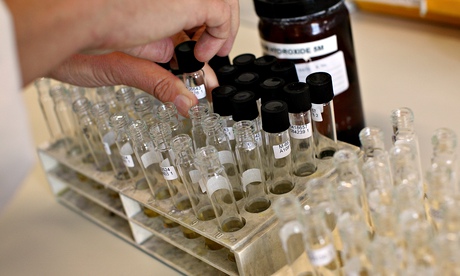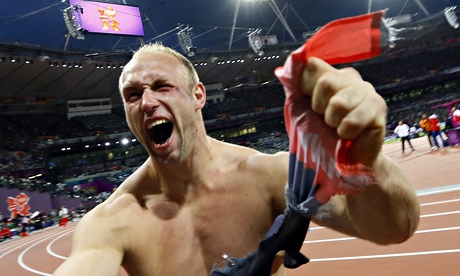What more can one say about Nike except that in a hotly contested field it once again leads the way in being the biggest hypocrite in global sport?
It urges women to Dream Crazier, throwing the spotlight on female stars who have shattered barriers and inspired the next generation, while also telling others, such as Allyson Felix and Alysia Montaño, that they will pause or reduce their contracts when they get pregnant.
It talks a good game on anti-doping, yet it sponsors the twice-banned sprinter Justin Gatlin, and until recently had a CEO, Mark Parker, who saw nothing wrong with discussing testosterone experiments with Alberto Salazar, who until his four-year ban was head of the company’s most prestigious training group.
And, as we were reminded again last week, it might sell a brand of Air Jordan trainers called Do The Right Thing but seems singularly incapable of taking its own advice.
Even when the former teenage phenomenon Mary Cain told the New York Times she was “emotionally and physically abused by a system designed by Alberto and endorsed by Nike”. the company could not help itself.
Cain alleged that Salazar – who denies the charges – kept pressing her to get “thinner and thinner and thinner” and reduce her weight down to 8st 2lb. And that, as a result, she stopped menstruating for three years, broke five bones, started self-harming and had suicidal thoughts.
Yet, while the company insisted it was taking Cain’s claims “extremely seriously” and that “these allegations are completely inconsistent with our values”, it also remarked that Cain had asked to rejoin Salazar’s Oregon Project training group as recently as April.
Someone, surely, in Nike’s senior PR team should have pointed out that this not only made the company look petty but was also a deeply callous response to a very vulnerable young woman.
Cain’s response, while heartbreaking, was also impressively powerful. “I wanted closure, wanted an apology for never helping me when I was cutting and, in my own, sad, never-fully healed heart, wanted Alberto to still take me back,” she said. “I still loved him. Because when we let people emotionally break us, we crave more than anything their very approval.”
Other female athletes have since made claims about Salazar’s obsession with their weight. Yet where could they have turned, given Cain insists there was no dedicated nutritionist or psychologist at the Oregon Project?
The other tragedy in this is that Nike is by far the biggest corporate backer of track and field, sponsoring hundreds of stars and several national federations such as US Track and Field and UK Athletics. If it took its dollars away, the sport would be in an even bigger crisis. That gives Nike enormous potential power to do good, to admit any past failings and to promise to lead the way in instituting reform. Yet it has chosen the other way. And so still it stumbles and fumbles and fails.
But it is not just at Nike where athletes’ voices are not being heard by the powerful. It is all across the sport. Hours before Cain spoke out, athletics’ governing body announced that it was removing (or restricting) the 200m, steeplechase, triple jump and a number of other events from its prestigious 2020 Diamond League schedule – which would also be reduced from two hours to 90 minutes.
The reason, according to IAAF president, Seb Coe, is to make a “faster-paced, more exciting global league that will be the showcase for our sport”.
I have not found a single current athlete who agrees with the decision, which was reached after online research in China, France, South Africa and the US; post event surveys in Belgium, Great Britain and Switzerland; and click-throughs on Diamond League social media videos during 2019.
You could drive a Usain Bolt-sized hole through that methodology. If the IAAF had surveyed Kenyans and Ethiopians, I bet the 5,000m and steeplechase would have been among the most popular events. In Colombia, it might have been the triple jump. It also seems very odd that the 200m will feature only occasionally, given it is the main event of both Noah Lyles, the US sprinter talked about as the next Bolt, and Britain’s Dina Asher-Smith, whom Coe himself has talked up as a poster-girl for Tokyo 2020.
Coe is a keen football fan. He must know that any smart manager plays his star performers in their best positions. Chopping so many events is downright peculiar given the IAAF recently made great virtue of the fact that 43 countries won medals at the world championships in Doha.
Meanwhile, Cain has called for more protection for young female athletes as a key change the sport must make. “We need more women in power,” she said. “Part of me wonders: if I had worked with more female psychologists, nutritionists, even coaches, where I would be today.”
Of course she is right. But it is not enough. Athletes also desperately need a powerful and independent union to represent and protect them. That will help to ensure sponsors and federations do not pay lip service to the right thing, and also that coaches who care more about winning than protecting their athletes are called out.
And, most of all, these stars must speak out. Of course, criticising a federation, coach or sponsor runs the risk of their being marginalised or ostracised. But if athletes do not holler about the issues they face, who will ever hear them?











